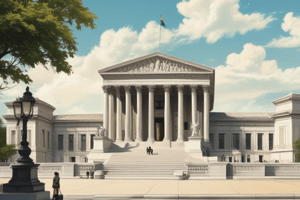Podcast
Questions and Answers
What is one way the Supreme Court exerts its power over the legislative and executive branches?
What is one way the Supreme Court exerts its power over the legislative and executive branches?
- By finding acts of Congress or the executive branch unconstitutional (correct)
- By recommending laws to Congress
- By directly vetoing executive orders
- By reviewing the legislative process for fairness
What was the primary event that led to the Supreme Court taking up the Marbury v. Madison case?
What was the primary event that led to the Supreme Court taking up the Marbury v. Madison case?
- The immediate intervention of the Supreme Court in new judicial appointments
- Thomas Jefferson's attempts to dissolve the Federalist influence in government
- The outgoing Federalist administration's attempt to issue commissions for judges (correct)
- William Marbury's public campaign for his judicial position
How do original and appellate jurisdiction differ in the Supreme Court?
How do original and appellate jurisdiction differ in the Supreme Court?
- Appellate jurisdiction can only be exercised in capital cases
- The Court hears most cases through appellate jurisdiction, but original jurisdiction applies to specific cases (correct)
- Original jurisdiction applies only to cases involving the President
- Original jurisdiction allows the Court to hear all cases without restrictions
What does the appointment process of Supreme Court justices suggest about their democratic legitimacy?
What does the appointment process of Supreme Court justices suggest about their democratic legitimacy?
What steps does the Supreme Court follow when reaching a decision in a case?
What steps does the Supreme Court follow when reaching a decision in a case?
Flashcards
Supreme Court's Power of Review
Supreme Court's Power of Review
The Supreme Court can declare laws passed by Congress or actions of the executive branch unconstitutional.
Marbury v. Madison Case
Marbury v. Madison Case
A Supreme Court case that established the Court's power of judicial review.
Supreme Court Jurisdiction
Supreme Court Jurisdiction
The Supreme Court has original jurisdiction in cases involving two or more states, ambassadors, or public ministers, and appellate jurisdiction in most other cases.
Supreme Court Decision-Making Process
Supreme Court Decision-Making Process
The Supreme Court reviews briefs, hears arguments, discusses their opinions in private meetings (conferences), and produces majority opinions along with concurring and dissenting opinions.
Signup and view all the flashcards
Supreme Court Democracy
Supreme Court Democracy
An unelected court is still democratic, as Supreme Court justices are appointed by elected representatives, not directly by the people.
Signup and view all the flashcards



